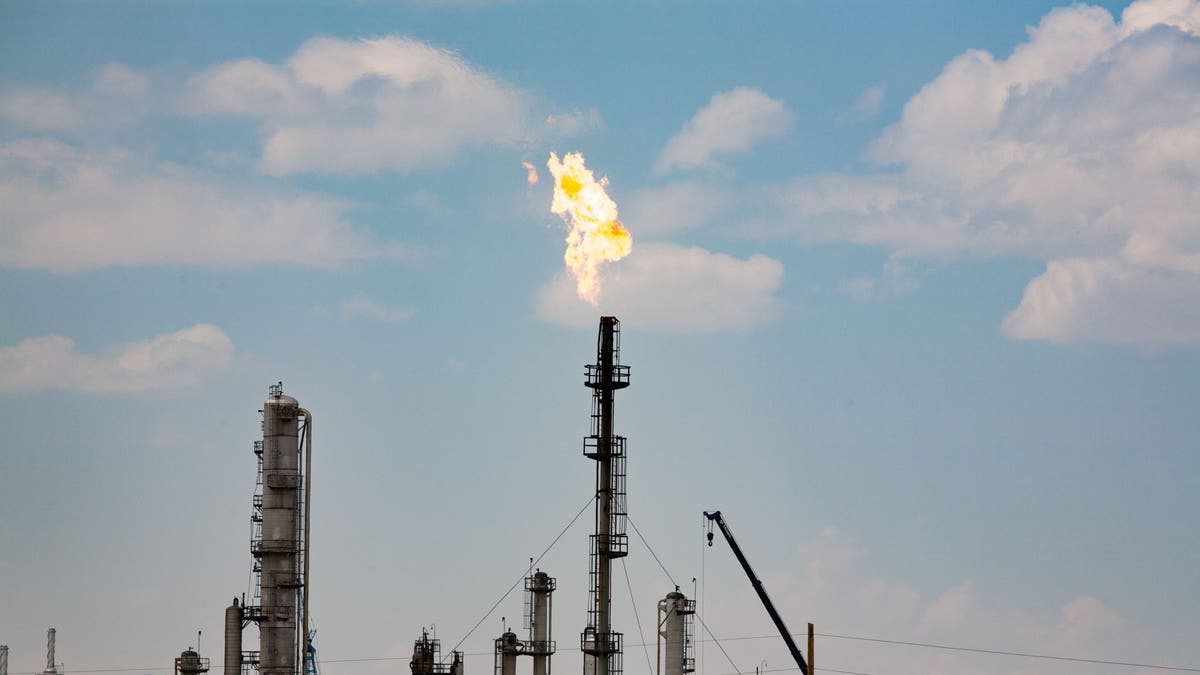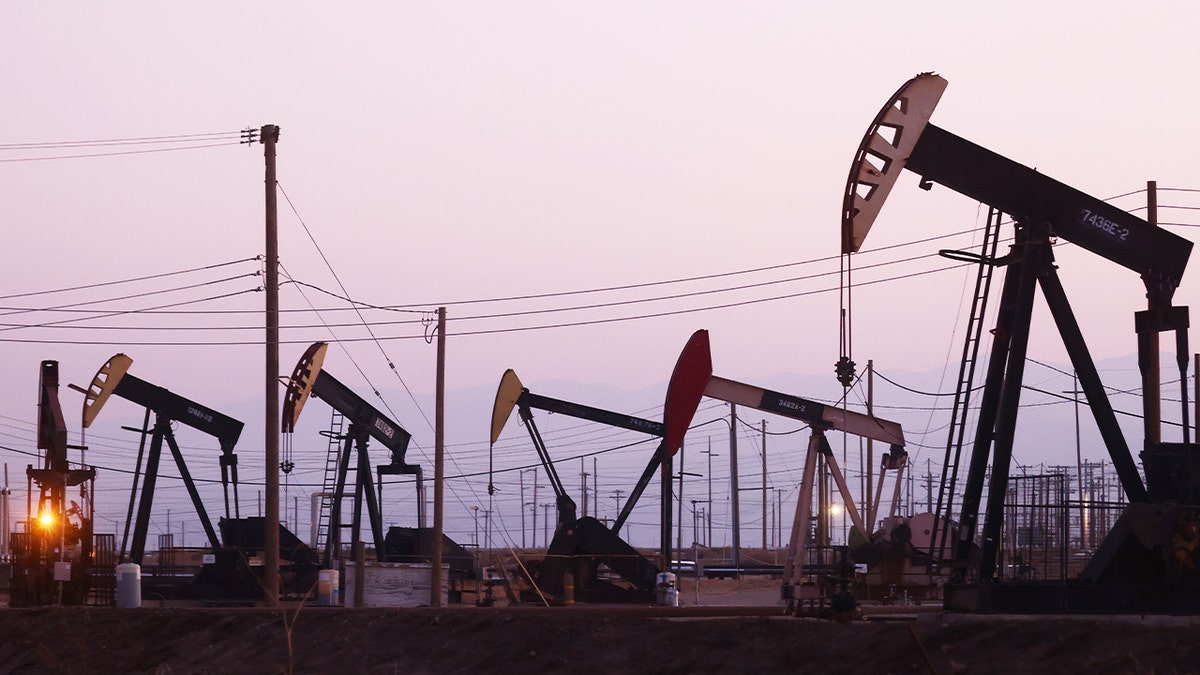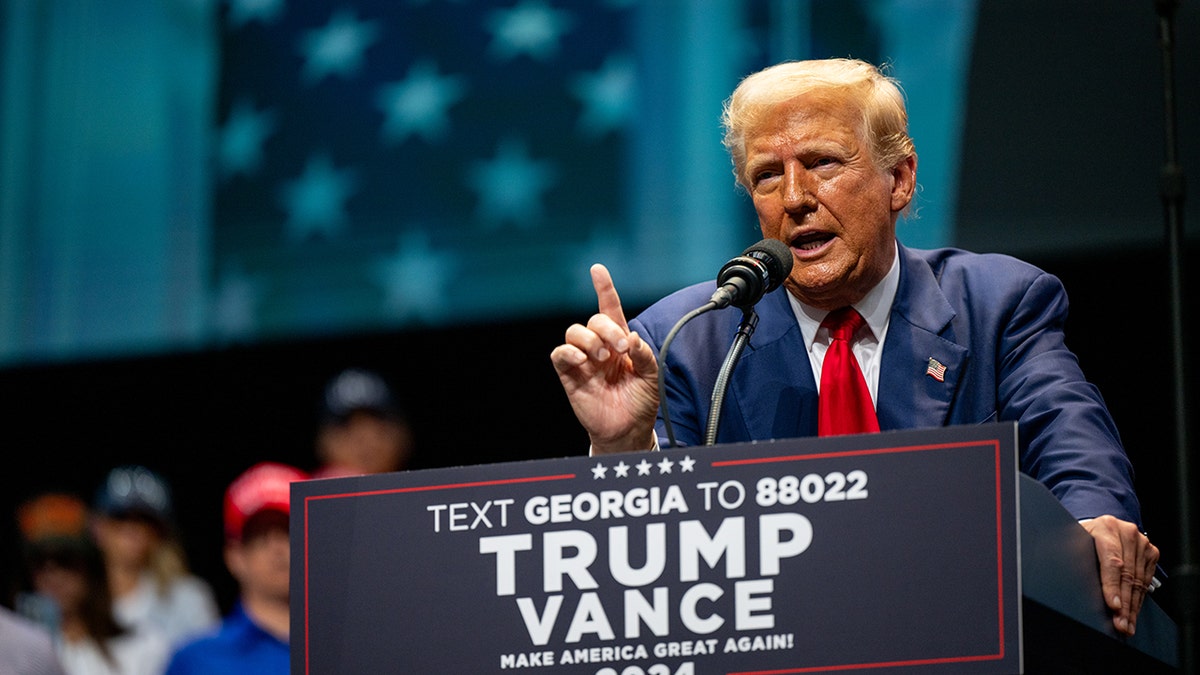Climate activists cover US Embassy in London with orange paint after Trump's projected win
Members of Just Stop Oil sprayed orange paint on an exterior wall of the U.S. Embassy in London after former President Trump was projected to retake the White House. (Jamie Lowe/Just Stop Oil)
President-elect Donald Trump spent much of his time on the 2024 campaign trail pledging to restore U.S. energy dominance through bolstering oil and gas production, expanding fracking and lifting a pause on liquefied natural gas exports, a sharp contrast with his predecessor and prompting new questions over how he will move to enact some of these sweeping changes.
Trump vowed at a Pennsylvania rally last month that he would lift the Biden administration's "war on energy" and "disastrous" energy policies that he argued permeated the current administration.
"They annihilated your steel mills, decimated your coal jobs, assaulted your oil and gas jobs and sold off your manufacturing jobs to China and other foreign nations all over the world," Trump said of the Biden administration.
It's not the first time Trump has used energy and climate issues to cut a sharp contrast with his predecessor.

Women cheer as Republican presidential candidate Donald Trump arrives to speak at a campaign rally in Reading, Pa., on Nov. 4, 2024. (Ed Jones/AFP)
The Republican president-elect has vowed to use his second White House term to re-exit the Paris climate accord, undo strict emissions standards for vehicles and power plants, and bolster production of U.S. oil and gas, including through fracking, which is the controversial technology by which pressurized fluids are used to extract natural gas from shale rock.
In the days after his victory, industry groups representing the nation’s biggest oil and gas producers told Fox News Digital they have little doubt Trump will make good on these promises in a second term.
"Energy was on the ballot" in the 2024 elections, American Petroleum Institute President and CEO Mike Sommers said in a statement.
In electing Trump, Sommers said voters "sent a clear signal that they want choices, not mandates, and an all-of-the-above approach that harnesses our nation’s resources and builds on the successes of his first term."
But some areas will be more difficult for Trump to act on unilaterally.
EPA'S NEW RULE TO CHARGE OIL AND GAS COMPANIES FOR EMISSIONS COULD FACE A TRUMP RECKONING

Excess natural gas is burned off at an oil refinery in Sinclair, Wyo. (Marli Miller/UCG/Universal Images Group via Getty Images/File)
Trump has for months vowed to "undo" the Inflation Reduction Act, the Democrats' marquee climate and clean energy spending legislation that allocates $369 billion in subsidies aimed at reshoring investments for electric vehicle manufacturing and battery production as well as new utility-scale wind and solar projects.
Trump has described the law as the "greatest scam in history," but on his own it's unclear what actions he could take to undo the legislation.
Though Trump now enjoys majority Republican support in both the House and Senate, it's unlikely he would move to completely overturn the Inflation Reduction Act, in part because a large chunk of the funds designated under the law to help subsidize the build-out of clean energy projects and manufacturing plants has already been awarded.
Much of the funding, in fact, has gone to Republican-led states.
TRUMP'S ELECTION WIN SIGNALS A SHIFT IN US ENERGY: PAUL DABBER

Trump has vowed to end the Biden administration's "war on energy" and "disastrous" energy policies. (Mario Tama/Getty Images/File)
Other hurdles also exist. Since the IRA is a law, Trump could not move on his own to undo the legislation.
But he could take certain steps to restrict eligibility for certain tax credits or incentives.
As president, Trump could tighten restrictions for automakers eligible for the electric vehicle tax credit, ramping up manufacturing costs and in turn making electric vehicles more expensive for consumers.
Trump is also likely to introduce new tariffs on certain Chinese-made EVs and other products in a bid to incentivize Beijing to build more of its EVs in the U.S.
On that front, Trump said this year he is considering tariffs of "60% or higher" on Chinese-made EVs to prevent their vehicles from saturating the U.S. market.
But this could backfire, some experts warn. The Tax Foundation’s Center for Federal Tax Policy estimated that even a 10% tariff on Chinese-made EVs could raise taxes for U.S. consumers by more than $300 billion per year.
It could also threaten retaliatory measures from Beijing and other trading partners, including retaliatory tariffs on U.S. goods, the group said.
Still, Republicans and industry groups are unlikely to let up on the pressure to act.
TRUMP SELECTING ZELDIN FOR EPA ROLE SHOWS HE IS PREPARING TO ‘LAWYER UP’ THE AGENCY, JOURNALIST SAYS

Republican presidential nominee Donald Trump speaks at a campaign rally in Savannah, Ga., on Sept. 24, 2024. (Brandon Bell/Getty Images)
The American Petroleum Institute published a five point "policy road map" this week, seeking to influence the incoming administration's actions in the auto manufacturing sector. Among its asks: Rolling back the Biden administration’s stringent fuel economy standards for vehicles, which target an 8% reduction in tailpipe pollution for both 2024 and 2025 model years and then increase to 10% in 2026.
It also asked Trump to issue a five-year plan to expand offshore oil and gas drilling leases.
CLICK HERE TO GET THE FOX NEWS APP
"Our country has a generational opportunity to fully leverage U.S. energy leadership to improve the lives of all Americans and bring stability to a volatile world," Sommers said in a letter that API sent to Trump alongside its plan.
"It has never been more vital that America control its energy future."
But others doubt Trump will renege on an industry that has already seen billions of dollars of investments from automakers.
"Presidents come and go, but the auto industry motors on," Mark Schirmer, director of industry insights and corporate communications at Cox Automotive, told reporters this week.














































